I meant that hand raised pets probably wouldn't survive, if you were talking to me

As I understand it, the hybrid cockatoos are the result of pet cockatoos escaping and joining a wild flock... could be wrong though. Have heard that wild flocks of cockatoos are learning to talk, so when you go to a park in Australia occupied with 'toos, you might hear them talking [human speech] from the trees! LOL
Thats completely different... a hybrid of two macaws is on the species level... where as all breeds of dogs are the same species.

I'm aware. =) I know it's bad to compare dogs to parrots, but at least with dogs, people can relate! And I was thinking of illnesses such as hip displasia where some species are more prone to it than others... so breeding a dog with a 30% chance of hip displasia to a dog breed not known for hip displasia will result in mutts with a lesser chance of hip displasia than the parent dog with the chance of it. And yes, I'm also aware hybrid vigor is strongest in first generation offspring... but this is assuming you breed said animal back to one of the parent species.
Imagine the potential hybrid vigor in a 3 or 4 species hybrid!
Most anti-hybrid people are of the belief that hybrid parrots have all sorts of health problems and should not be bred. This is simply false! Yes, it's true to a degree, but it's also false because they don't understand genetics and how well they work.
Short and simple, I'm against the creation of hybrids! But if it's going to be done, I want to see it done responsively and said hybrids sold as what they are. I frequently see mixed pairs being sold as pures species.
i.e. pairs
Mitred conure x cherry head
Sun conure x jenday
Jenday x gold cap
And I'm seeing said hybrids, typically sunday conures and the mitred x cherry head (or red head hybrids in general) being sold as pure birds. I hate it!
The excuses I get from these people? "The person I bought this bird from told me it was this species" - therefore the person who sold them this bird is "obviously right" and they aren't creating hybrids! *major facepalm*
I'm not even going into the subspecies hybrids which also annoy me! The only subspecies people care about are those found in eclectus. Any other species and most people don't care! (amazons being a bit of an exception). Green cheek conures. Mitreds. Blue crown conures. Senegals. Sulphur crested cockatoos. These birds all have subspecies, not to mention all the others unmentioned. Many of them are being hybridized unknowingly.
After all is said and done, yes I'm still fascinated by hybrids! In fact, even though I do not own a hybrid, I've created a group of hybrid parrot photos! And I'm always looking to add more of birds I haven't seen before! Or those I simply don't have photos of!
Flickr: Hybrid Parrots

 :red:
:red:

 :red:
:red:
